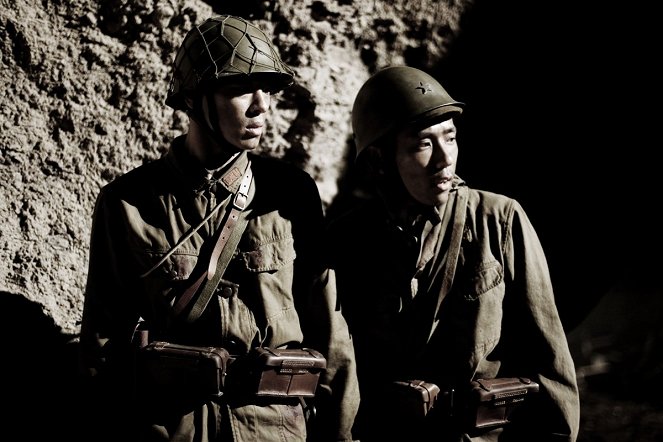Reżyseria:
Clint EastwoodScenariusz:
Iris YamashitaZdjęcia:
Tom SternObsada:
Ken Watanabe, Kazunari Ninomiya, Tsuyoshi Ihara, Ryō Kase, Shidō Nakamura, Takumi Bando, Yuki Matsuzaki, Takashi Yamaguchi, Nae Tazawa (więcej)VOD (3)
Opisy(1)
Akcja filmu skupia sie wokół japońskiego generała Tadamichi Kuribayashi (postać historyczna), pod którego dowództwem japońscy żołnierze przez 40 dni odpierali atak armii Stanów Zjednoczonych na małą wyspę Iwo Jima. "Red Sun, Black Sand" to próba spojrzenia "z perspektywy japońskiej" na dramat pod Iwo Jima, to obraz dopełniający dzieło Eastwooda - obok wydarzeń widzianych oczami amerykańskiego żołnierza we Flags of Our Fathers. (Galapagos)
(więcej)Materiały wideo (2)
Recenzje (8)
Iwo Jima Island - deserted, no water, full of bothersome insects and afflicted with unbearable humidity. But still, it is a strategic key to the Pacific... If I hadn’t known anything at all about the Letters I wouldn’t have hesitated an instant in swearing that this was filmed by Kurosawa. Everything from picture composition, introduction and departure from plot action through supporting characters through to the overall atmosphere - this all bears his signature. Clint Eastwood has made an excellent picture about the senselessness of war and respect for the enemy. Despite the fact that the battle scenes aren’t at all central to the movie, we get several here and they are unarguably outstanding. Don’t expect a second Saving Private Ryan, though. This is a considerably more intimate experience. Ken Watanabe plays is Mifune-scale role exemplarily. If the first half of Letters from Iwo Jima had been shorter, there would have been nothing to fault.
()
A much more sincere and stronger war film than the tearful and extremely pathetic Flags of Our Fathers. Clint Eastwood really stepped up his game in the second film, which, in contrast, shows the conflict from the other side and tells an excellent story full of Japanese traditions, customs, and tactics. How accurately it reflects reality can only be judged by eyewitnesses and war experts, but I dare say that the film was presented to the audience in a very bearable way. Thank God it doesn't just show the Japanese as suicidal lunatics and heartless killing machines, but also portrays them nicely from the other side right from the beginning. From young boys separated from their families to high-ranking officers with connections to the West, who are willing to proudly sacrifice their lives for their country. Watanabe is excellent, the action is decent and the non-combat scenes are very impressive. This solid film is worth watching if inly for the fact that we may have the opportunity to see a comprehensive view of an event in the war from this different and culturally distinct perspective, despite some minor flaws and a slightly excessive runtime (or rather, some unnecessary scenes).
()
Without a doubt one of the best anti-war films ever to grace cinema screens. Eastwood is not playing "soldiers" or "good guys vs bad guys", his view of war is much more complex. His film is one of the few that looks at the soldiers of the Berlin-Rome-Tokyo Axis from the human side (in this respect, of the few cases before him, I remember Vilsmaier's Stalingrad, or the emotional ending of Riders in the Sky) and demythicizes the conventional view of ordinary Japanese soldiers as heartless war creatures with heads full of kamikaze. No matter which side of the conflict you are on, talking to a friend about family, making jokes, fearing death and questioning the meaning of war are all human feelings that are the same for everyone, regardless of the uniform they wear. Eastwood tells the story sparingly, but every minute has its place, and some scenes – the mass suicide, Baron's conversation with the wounded American soldier, the shooting of the prisoners, even the scene with the dog – are very memorable. And why not admit it, reading a letter from the mother of a deceased prisoner of war brought tears to my eyes, and in Eastwood's masterful rendition such moments are simply hard to resist. And if you think they are all made up, you are a lost cause. It is quite clear from the film that the greatest enemy in a war conflict is not a combatant from the enemy side, but the nonsensical orders of a moron in a superior uniform. Otherwise, the fight scenes have verve, although Eastwood commendably doesn't try to be as spectacular as possible (unlike, for example, Spielberg in the final battle in Saving Private Ryan) and the charismatic Watanabe is growing into a great actor in my eyes from film to film. With all due respect to my favorite Marty and his The Departed, the clear Oscar winner in my eyes is once again "Iron Old Man" Clint and his sensitive, empathetic masterpiece. The average rating on IMDb, 8.3/10, says much more about its real value than here on FilmBooster. And I don’t think half the votes there come from Japan.
()
Clint Eastwood is an experienced and highly professional craftsman of American film studios and I don't think he has ever disappointed me with any film, but none of his movies have really made me excited, either. He usually represents a safe bet, as he is disciplined but mostly predictable. I'm not saying that Letters from Iwo Jima is a bad war film, I just feel like more could have been extracted from the given material. The most intense battles on the Pacific front took place on this island, where strength crushed strength and determination clashed with determination, and considering how intense that battle was, I didn't really see much of that excitement in the film. The execution scene of two Japanese prisoners was perhaps the only surprising and cinematically enjoyable moment; otherwise, Eastwood's journey into World War II history left me rather indifferent emotionally. Overall impression: 60%.
()
Letters from Iwo Jima is a nice film. The Japanese view of the incident is darker, more accomplished and more meditative than the American view depicted in Flags of Our Fathers. And, mainly, it works internally. The spectacular action scenes are all the more impressive due to the fact that there is a minimum of them and we see them only from a distance, thanks to which the film maintains a powerfully intimate nature. The sentiment and simplicity are tastefully balanced with a beautiful visual aspect and the minimalism of Clint Eastwood’s music, whose dominant feature is a fragile piano motif. Another pleasing aspect is the filmmakers’ affection for the Japanese and, in contrast to that, their contempt for the American soldiers in some scenes. It’s a shame that Flags is such an unworthy sibling to Letters and drags this ambitious diptych of films down to the level of a quickly thrown-together Oscar frontrunner. If more work had been put into Flags, these two films could have gone down in history together.
()



Reklama